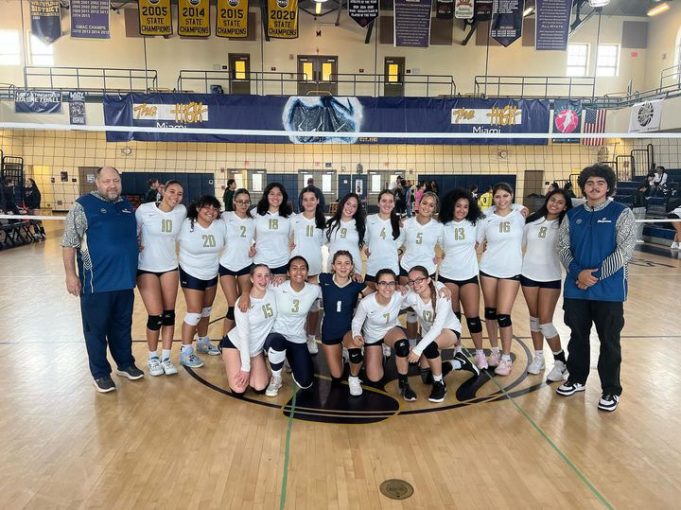More Than Just A Sting
October 17, 2018
Agenda:
7am-2:20pm – School
2:25pm-2:35pm – Club Meeting
2:40pm-3:30 – Tutoring
3:35pm-6pm – Practice
6:10pm-6:40pm – Homework
6:45pm-7:15pm – Dinner
7:20pm-7:30pm – Shower
7:40pm-10:15pm – Homework
10:20pm-11:20pm – Study
11:30pm-5:20am – Sleep
This is what your typical Miami High student leader’s daily agenda looks like. From one activity to another it can sometimes feel like the day is never-ending or that there are not enough hours in the day. You may be wondering how these students are able to do it and the answer is…. BALANCE
Are students able to balance?
Many students involved in multiple activities at Miami High believe they do an excellent job balancing their lives. Senior Alberto Rivas, who is also Honoria president and a member of Best Buddies and 5000 Role Models, said that he is able to do everything he wants to do and is able to avoid unnecessary stress.
Sophomore Victoria Mendez, Class of 2021 president, an officer for SHS and HOSA, member of multiple other clubs, and an athlete, says that she is always able to do “things ahead of time,” which allows her to balance all her activities.
However, that is not the case for all students at Miami High. Senior Fabrizio Aragon, who is FBLA 1st VP and a member of HIP, R-Tech, and BETA, says, “I manage well, but when classwork piles up with personal life, it becomes difficult.”

How do they do it?
Not all students are able to balance their activities, academics, and personal life, but some are able to find a way. Senior class secretary Briana Arroliga, who is also Equal Access President and an officer for BETA, Choir, and Tri-M, says, “I don’t have much of a personal life.” Her social life is school and church. She proceeded to say that she balances “by sticking to plans and having self-discipline.”
However, some students don’t have much of an explanation as to how they balance. Darius Wilson, who is SGA 2nd VP; an officer for BETA and NHS; member of SHS, the Chess team, Top Gun dance; and also has a part time job, does not have an idea as to how he does it. He says, “Sometimes I have to get home at 1 a.m. on school nights, but somehow I just do it.”
What’s the impact?
Learning how to balance everything can positively impact someone’s life. Senior Mayisha Perez, a journalist for the Miami High Times, BETA, member of Senior Class Board, and who works part time, says that it is a lot easier to juggle more than one thing at a time as a result of learning how to balance.
Junior Amanda Suarez, who is the co-captain of color guard, Class of 2020 secretary, a BETA member, and SGA senator, says, “I anticipate that at one point it will positively impact my life, which is why I am going to work on it.”
Life before balance
Learning how to balance does not occur suddenly. One usually chooses to learn after failure and an abundance of anxiety. While many students now can balance their lives, this was not always the case. SGA President Ismara Corea, who is also Treasurer for WOT; the Yearbook senior editor; member of BETA, the College and Career Club, and Best Buddies, described her life before learning how to balance as unproductive and stressful.
Senior David Andrade, who is Mu Alpha Theta President, SHS Corresponding Secretary, the captain of the Bowling and Cross-Country Teams, and a member of BETA, recalls a time when he would go home at 2:20, finish his homework early, and “just feel useless” when he had nothing else to do. Now that’s not the case, as you can find David at school until the wee hours of the night.
The key to balancing
Learning how to balance consists of many key components. Junior Class Vice-President Victoria Hernandez believes that the key is time management. “If one does not know how to successfully manage their time, they won’t be able to get through the day in one piece,” she says. Victoria said that she learned through the guidance of many advisors and teachers helping her organize.
SGA Treasurer Will Smith, who is also a member of Interact and Yearbook, believes that mental organization is essential. “If you don’t prepare yourself mentally, then that agenda will be of no use,” said Will, who is also a firm believer in trial and error as everyone is different when it comes to balancing.

The difference balance makes
Balancing is not an easy task for everyone to master. Some teachers, such as the Junior Class advisor and world history teacher Ms. Armas, have noted that the differences between students who can balance and students who cannot is like “day and night because the kids who are balanced and organized are more successful.” She then went on to say that it is a rarity for students who are able to balance without trying, but these students are typically not very involved.
Why you need to learn
Whether someone is involved in one or multiple activities, balance is key to survival in everyday life. Sophomore Class advisor and biology teacher Ms. Gutierrez-Carasco stated, “In the real world, life forces you to balance family, work, and all the extra stuff. If you don’t learn how to balance and distribute your time evenly, life will be super stressful with everything that gets thrown at you.”
Tips and Tricks for learning how to balance
| What to do: | Why: |
| · Get a planner. | It will keep you organized and will not allow you to forget what you need to do, as long as you keep up with it. |
| · Prioritize everything on your agenda | If you don’t prioritize, then everything will catch up to you and result in stress. |
| · Don’t procrastinate | If you procrastinate then it will ruin your ability to manage your time and induce stress. |
| · Create reminders for yourself | It will help you to stay on track and follow your schedule. |
| · Use all the free time you have to finish tasks | Helps you to get ahead of your schedule so you can have time to do other activities and reduces stress. |
| · Space out your tasks | To assure that everything you need to do gets done correctly and with enough time to spare. |
| · Learn how to adapt | Sometimes things will not go as planned and you need to learn to go with it. |




